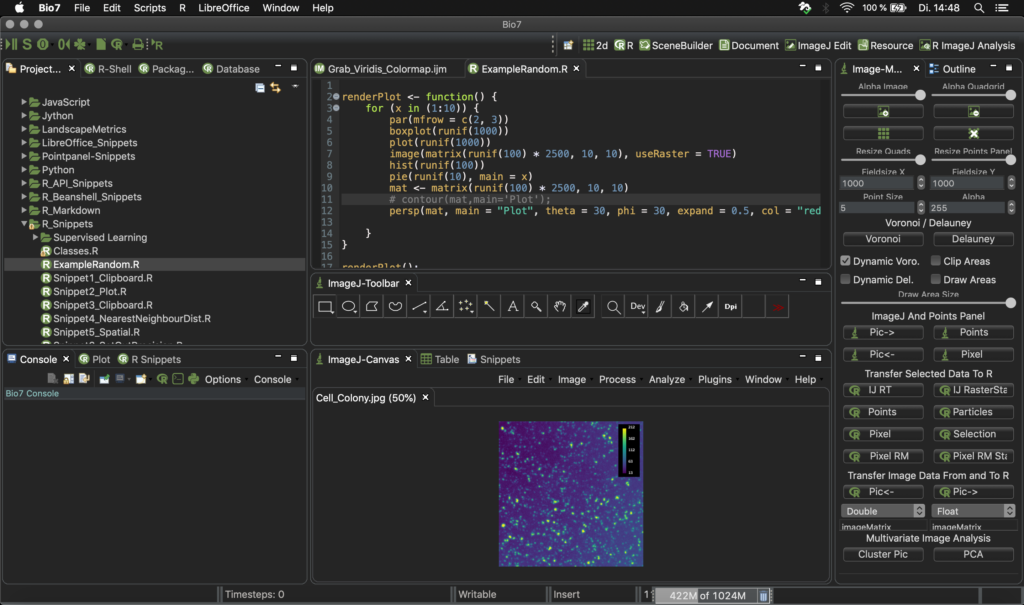27.03.2019
A new release of Bio7 is available which is built upon Eclipse 4.11 and the latest Java OpenJDK. This new version comes bundled with OpenJDK 12, supports the dynamic compilation of Java 11 and fixes several annoying bugs on MacOSX (e.g., shutdown crashes).
The R interface has been improved and the R-Shell now updates the workspace display automatically after a R code evaluation or R data transfer.
In additon for Bio7 3.0 the themes have been improved (especially for MacOSX and the Mojave dark mode) and some Touch Bar actions for MacOSX are available, too (if the MacOSX device has a Touch Bar).
Screenshots:
Screenshot MacOSX Mojave (dark mode)

Screenshot Linux Ubuntu 18.10:
Release Notes:
General:
- Built upon OpenJDK 12 and Eclipse 4.11
- Bundled with OpenJDK 12
- Improved script menus
- Touch Bar actions for MacOSX devices when a Touch Bar is available (can be enabled in the Bio7 preferences)
- Image perspective is now hidden by default (we have already the ImageJ edit perspective)
- Updated SSH executables for Windows
- Multiple Images and PDF files can now be opened from without a lost focus
R:
- Windows version bundled with R 3.5.3 and Rserve
- R-Shell displays objects after evaluation
- More default scripts in the R-Shell scripts menu (PyRserve, Install Rserve, etc.)
- R-Shell visual improvements (line height of code completion – see preferences)
- Added Touch Bar actions for MacOSX (can be enabled in the preferences)
- Clipboard code evaluation improved
- Improved browser selection for rmarkdown, knitr, R help, etc.
- Improved text search speed for package installation search (MacOSX)
Java
- Dynamic compilation of Java 11 supported
- Added support for Java modules in the preferences (if necessary)
- Added support for add-on libraries as installable plugins (OSGI)
- *.java or *.class files can be put in the scripts menu for compilation (*.java) or execution (*.class)
- Added support to compile Java files on the ImageJ classpath (which is a seperated OSGI classpath) to compile ImageJ plugins with dependent *.jars
- High dpi scaling for Java Swing and AWT available if configured in the Bio7.ini file (-Dsun.java2d.uiScale=2.0 for high dpi displays)
- Updated JOGL to version 2.3.2 with custom fixes
- Changed the 3D interfaces (WorldWind, 3d) to the faster NEWT interface.
Table:
- Excel export now exports all opened tabs as sheets in one file
- Images in cells are now exported in excel files, too (anchored at cells)
- Improved scripts menu
ImageJ:
Huge amount of changes since the last release. For all changes, see:
https://github.com/Bio7/EclipseImageJ1Plugin
Download and Installation:
Windows:
Just download the *.zip distribution file from https://bio7.org and unzip it in your preferred location. Bio7 comes bundled with a Java Runtime Environment, R and Rserve distribution and works out of the box.
Linux:
Download and extract the installation file from https://bio7.org.
For Linux you have to install R and Rserve (see Rserve installation below!).
MacOSX:
Download and extract the installation file from https://bio7.org.
If you start Bio7 a warning or error can occur because of the changes how Apple treats signatures! To allow Bio7 to start see this instructions for Yosemite, Sierra and Mojave:
Yosemite: Open an app from an unidentified developer
Sierra: Open an app from an unidentified developer
In addition for MacOSX you have to install R and Rserve (see below!).
Linux and MacOSX Rserve (compiled for cooperative mode) installation:
To install Rserve open the R shell and then execute the menu action “Options -> Install Rserve (coop. mode) for R …” for different R versions. This will download an install Rserve in your default R library location, see video below (please make sure that your default Linux R library install location has writing permissions!).
In cooperative mode only one connection at a time is allowed (which we want for this Desktop appl.) and all subsequent connections share the same namespace (default on Windows)!
How to install Rserve for Linux and MacOSX: https://youtu.be/tF7HbRBRIF
Installation of Useful R Packages
R packages which are useful in combination with Bio7 can easily be installed with the R-Shell context menu “Packages” action:
R-Shell context menu->Packages->Install_Default_R_Packages
Bio7 Documentation
For more information about Bio7 please consult the soon updated Bio7 User Guide.
A plethora of Bio7 videotutorials for an introduction can be found on YouTube.
